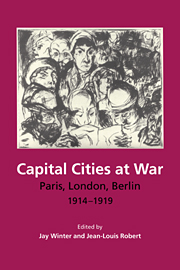Book contents
- Frontmatter
- Contents
- Note on joint authorship
- List of figures
- List of tables
- Part 1 Premises
- Part 2 The Social Relations of Sacrifice
- Part 3 The social relations of labour
- Part 4 The social relations of incomes
- Part 5 The social relations of consumption
- 11 Feeding the cities
- 12 Coal and the metropolis
- 13 Housing
- Part 6 Urban demography in wartime
- Part 7 Towards a social history of capital cities at war
- Statistical appendix and tables
- Bibliography
- Index
12 - Coal and the metropolis
Published online by Cambridge University Press: 15 December 2009
- Frontmatter
- Contents
- Note on joint authorship
- List of figures
- List of tables
- Part 1 Premises
- Part 2 The Social Relations of Sacrifice
- Part 3 The social relations of labour
- Part 4 The social relations of incomes
- Part 5 The social relations of consumption
- 11 Feeding the cities
- 12 Coal and the metropolis
- 13 Housing
- Part 6 Urban demography in wartime
- Part 7 Towards a social history of capital cities at war
- Statistical appendix and tables
- Bibliography
- Index
Summary
Introduction
In war the state reveals its essential character … It must prove itself capable of awakening and drawing together all of the nation's might … The stronger these challenges and burdens become, and the greater their reach into the life of the population, the more the war becomes a test of the entire state's legitimacy.
Problems with the urban distribution of coal were felt from the war's outset in all three cities, and in each case a significant proportion of the population faced both chronic and acute shortages. This chapter tells part of the story of material constraints and administrative reactions in wartime.
The case of coal illustrates well how administrators came up with differing strategies for dealing with wartime shortages in the domestic supply of coal for heating, lighting, and cooking. The measures promulgated in the three capital cities, and their outcomes, shed light on social relations within these cities in the war years and beyond.
The strategies followed by the British and German authorities to supply these populations with coal were antithetical to one another; and just as in other aspects of the economic history of the war, French responses to the problems of coal distribution reflected elements of both German and British policies. These differences may be summarized as follows:
In London: planning and organization under favourable conditions, with a relative abundance of coal, though with some serious short-term shortages. […]
- Type
- Chapter
- Information
- Capital Cities at WarParis, London, Berlin 1914–1919, pp. 342 - 373Publisher: Cambridge University PressPrint publication year: 1997
- 1
- Cited by



